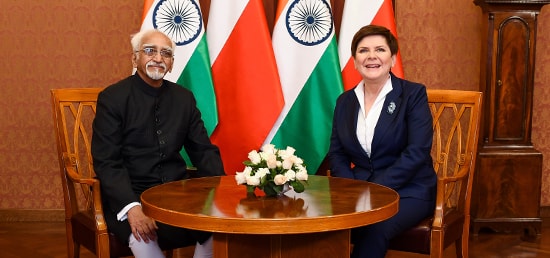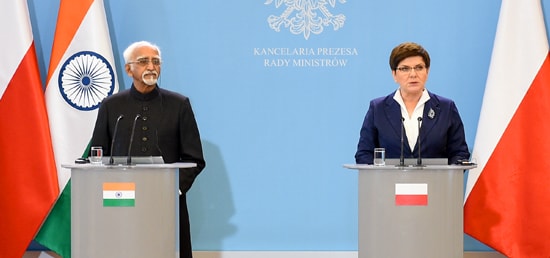
Ansari Abroad: Exposing double-speak on terror and changing narrative of India
Exposing duplicity on terrorism, articulating multiple images of India, extolling seven decades of Indian democracy and the importance of building bridges with Central Europe and Eurasia. It’s a challenge to compress these weighty themes in a few minutes, but that’s precisely what Vice-President Hamid Ansari did in a mid-air interaction with journalists while on his way back from a five-day trip to Armenia and Poland.
Mr Ansari, a former diplomat and an erudite scholar, is not the kind to resort to fiery rhetoric, but he was full of eloquent indignation at the continuing duplicity of some states who hide behind technicalities on the pressing issue of terrorism, which he rightly described as “a universal epidemic.”
Intensifying counter-terror cooperation figured prominently in his discussions with the top leadership of Poland and Armenia. India has been relentlessly pushing for Comprehensive Convention on International Terrorism for over two decades, but unfortunately some countries have chosen quibbles and sophistry to block its passage in the UN, which has stymied the fight against global terrorism. CCIT has a special resonance for Mr Ansari as it was during his tenure as India’s Permanent Representative of India to United Nations in New York in 1994 that India had launched a global outreach for CCIT. Till this day, the India-backed CCIT is embroiled in semantic sophistry and cold-blooded calculations by some countries due to their vested interests. Mr Ansari’s spirited response to a question on adopting the CCIT was, therefore, natural. Noting that every country is facing the problem of terrorism in a lesser or greater degree and understands the problem, Mr Ansari exposed sophistry practiced by some states by hiding behind technical niceties, a veiled reference to OIC nations which have been in the forefront of stalling the CCIT.
In the days he spent in Poland and Armenia, the vice-president also observed multiple images of India that permeated the perception of the country among people of these countries. In both Armenian capital Yerevan and Polish capital Warsaw, one was struck by the popularity of Indian films and food. The people one spoke to had their own story to tell, while some were stuck with clichés and stereotypes.
